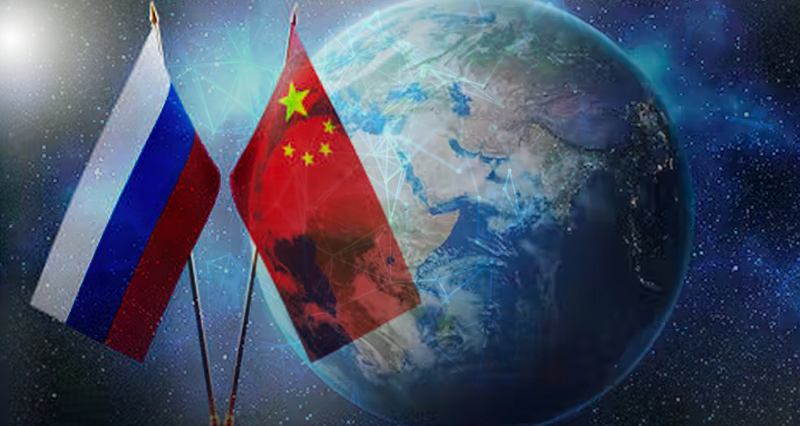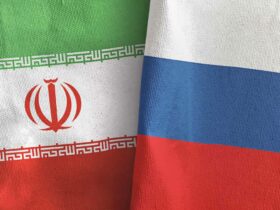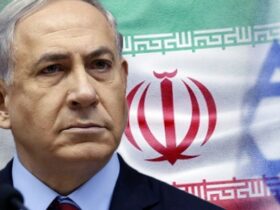China-Russia relations have become increasingly more decisive in the reshaping of the world order. In particular, the visit of Chinese leader Xi Jinping to Moscow has played a role in boosting the cooperation between the two countries. As the General Secretary of the Communist Party of China (CPC) Central Committee said to Russian President Vladimir Putin upon departure, “The world is undergoing changes that have not been seen in 100 years. If we are together, we will guide this change.”
It is natural for two neighboring countries with sound minds to establish good relations. However, Russia-China relations are mainly shaped within the context of the US’s fundamental strategy. The US’s goal of controlling Central Asian energy resources and routes unites the fates of Beijing and Moscow. The greatest obstacles to this strategy are these two countries with their deep-rooted state traditions and significant military and economic power. For the US to achieve its objectives, China and Russia must somehow submit to this strategy.
Washington is encircling these countries with military power. Actually encircling one of them also means the same for the other. The Taiwan and Ukraine issues are two significant examples of this.
But the US’s actions are not only based on military power. The dollar hegemony is the US’s most crucial weapon together with military power in achieving its goals. This hegemony is aiming to strangle Russia and China economically and give the US an advantage over them.
The end of the liberal-globalist system
The process has not gone as the US hoped, that is clear. The US’s liberal-globalist system took heavy blows from the pandemic and then Russia’s special military operation in Ukraine.
The era of laissez-faire economics has ended during this time. After the pandemic and special military operation in Ukraine, countries with state influence over their economies have succeeded while countries under full liberal dominance have become dependent on central intervention. The state-dominated economic system is now asserting itself worldwide.
The second point at which the liberal-globalist system has failed is the issue of borders. The world “ideal” without state borders and customs walls has ended. In this process, the borders between countries began to be drawn with “thicker lines”. Even Western authorities clearly state that nationalism and nation-states will be on the rise in the coming period. This rise inevitably entails the limitation of free movement of capital. As a result, this means the rebuilding of customs walls. National production economy and self-sufficiency have become much more valuable.
The third point where the globalist system has collapsed is the failure of neoliberalism and the idea of unlimited freedom in social life. Disciplined societies succeed, and the need for a strong, regulatory and protective state becomes more acute.
Building a multi-polar world
As the liberal-globalist system collapses, a multipolar world is being built in parallel. We have come to the end of the unipolar world that the US had dominated particularly since the 1990s. Countries like China, Russia, and even Türkiye are emerging as a separate pole against the US. Not only are centers of political resistance forming in Eurasia, but also the center of the world economy is shifting from the Atlantic to the Pacific as even Western economists admit.
Countries from the Shanghai Cooperation Organization (SCO) to BRICS are forming cooperation and alliance systems. These organizations, led by China and Russia, are becoming centers of attraction and expand day by day.
The US’s lost war
Power balances are also changing in terms of military and weaponry, which will have the final say when necessary. In this context, recent war simulations reveal an important fact. Official and semi-official Atlantic authorities frequently use such simulations. They particularly compare the US armed forces with those of Russia and China.
The results, as reported in the media, are not promising for the US. Especially when China and Russia are together, according to these simulations, the US has virtually no chance of winning. Moreover, these simulations mainly compare military forces but factors such as patriotism and the human element, which are advantages for Eastern countries, are not taken into account. War is not won merely with weapons, but even in that area the US is losing according to the simulations.
Although the US ranks first on the “world’s most powerful armies” list based on Western standards, Russia and China hold second and third places every year.
The strategy of distancing China and Russia from each other did not work
The US knows that it cannot win a war if China and Russia unite.
Trump’s strategy of severing Russia from China and thus isolating Beijing was for a reason. But it didn’t work either. In fact, Moscow and Beijing became even closer during that time. Biden also devised the same strategy in reverse: This time the main target was Russia and Moscow was to be isolated. Biden’s plans, like Trump’s, were thwarted by the Beijing-Moscow strategic cooperation.
Russia-China relations are experiencing a golden age politically, economically, and militarily. The fight against the COVID-19 pandemic strengthened this cooperation, and after Russia’s special military operation in Ukraine it entered a whole new stage.
Thus, the US has no chance of winning without separating China and Russia from each other.
During the Cold War, the US had favorable conditions in this regard. The Atlantic front was gripped with fear after the 1949 Chinese Revolution. A world where the USSR and China were allied could turn into a nightmare for the Western bloc. They even had a name for this threat: the Red-Yellow peril. Moscow-Beijing rift (leaving aside the ideological debates, the USSR’s acquisition of an imperialist character, and the Soviet system’s decay from socialism, etc.), was one of the main reasons the US emerged victorious from the Cold War.
Panic on the Atlantic front
Whether competition or cooperation prevails in China-Russia relations is decisive in terms of global power balances. Today cooperation prevails and this provides significant weight on the Eurasian side.
That’s why Xi Jinping’s visit to Moscow caused great panic in the Atlantic authorities. Looking at both the official statements and the Western media we can easily state that. The question standing out: Is a military alliance possible between China and Russia? Are there any steps in the direction of military cooperation?
Although neither Moscow nor Beijing openly articulate military alliances or cooperation and even deny it, the common fate in the issues of Ukraine and Taiwan somehow imposes it. The concern about cooperation in the field of weapons technology continues to gnaw at the minds of the Atlantic authorities.
Opposition to separatist and bigoted terrorism and color revolutions
The cooperation of China and Russia, which have multi-religious and multi-national structures, against Atlantic-backed ethnic and religious provocations and terrorism must also be evaluated on this basis. When the Shanghai Cooperation Organization was established (then the Shanghai Five), the common interests against separatist and bigoted terrorism played a significant role. We can also add opposition to the colorful revolution, the US’s violations of countries’ sovereignties and interference in their internal affairs.
End of dollar rule and sanctions
The importance of China-Russia cooperation in terms of world balances is not only about national security, military, and international politics, but also carries great significance in the fields of fighting against dollar dominance and the West’s unilateral sanctions.
The US uses the dollar and sanctions for the same purpose as its most advanced weapons. Western-dependent finance and banking systems are also an important trump card for forcing countries that pose obstacles to Washington to submit. That is not just about the economy, but also in a way a matter of existence.
Beijing and Moscow are united at this point. Because fighting these threats alone is not possible. The convergence of interests leads to joint moves.
The trade with national currencies the two countries have been focusing on for years has now started to bear fruit significantly. The share of national currencies in trade between the two countries increases significantly. This policy even goes beyond the borders of the two countries. Russia has now begun using the Yuan in trade with third countries. As Russia de-dollarizes its economy, the Yuan is becoming a reserve currency in the country.
Of course alternative banking and financial systems are also on the agenda.
China-Russia cooperation has rendered the West’s unilateral sanctions ineffective. Christine Lagarde, President of the European Central Bank, complains about this in special talks for a reason. While China obtains cheap energy, Russia can convert its significant export resources into money without being affected by Western sanctions. At the same time, Chinese products are filling the areas left by the withdrawal of Western companies.
Two countries complementing each other
For these reasons, the prominence of cooperation over competition is not just an option, but a necessity for Moscow and Beijing. Countering the military threat from the Atlantic front and preventing the use of the economy as a weapon can only be achieved by creating appropriate cooperation models.
While these cooperation models change the military balance of power in favor of Eurasia, the shift of the world economy to the Pacific, the growth rate achieved by China signal the Asian era in the economy.
China and Russia complement each other in the military and economic fields based on a multipolar world. One’s advantage compensates for the other’s deficiency.
Multi-dimensional cooperation
The strategic rapprochement between the two countries is not limited to these areas. There are ongoing and growing collaborations in tourism, education, sports, culture, agriculture, space, nuclear energy, and transportation. In last visit of Xi Jinping sports were an important focus of the talks between the delegations. The number of Chinese students in Russian universities is considerable. After Russia’s special military operation in Ukraine Chinese learning skyrocketed in Russia. Until the pandemic, China was the country with most tourists to Russia. More examples can be listed here.
Narrowing fields of competition
As we mentioned earlier, as the necessity of cooperation becomes more apparent, the areas of competition are narrowing and many of them are being resolved amicably.
Russia’s shift from the front of the shareholder to that of the shared with the dissolution of the USSR played a significant role in reducing the Russia-China competition of the Cold War period. Russia’s destiny has become aligned with that of the oppressed world and developing countries.
However, there were still some areas of competition between China and Russia. For example, Russia was skeptical of China’s “One Belt, One Road” project. According to this view, the Atlantic was planning to include China in the global system while excluding Russia. The “One Belt, One Road” project was also planned to reach Europe by bypassing Russia. However, when Xi Jinping became China’s president, Russia was included in the project and all the doubts in Moscow’s mind disappeared. The personal relationship between Putin and Xi Jinping played and continues to play a decisive role in this regard.
As a result of this, the differences in their views on globalization ceased to be a problem. China’s utilization of opportunities provided by globalization to become a competitor and target of the US generated positive outcomes for Russia.
Another issue having purposefully been kept on agenda between China and Russia was that Russia’s eastern regions, which are low in population but vast in territory, could be invaded by China. Contrary to Russia’s east, both the population and the money were plenty in China. It was often said that this situation could pose a threat to Russia.
I asked this issue to my dear friends, Aleksandr Galushka, who served as Russia’s Far East Development Minister in the Russian Federation government between 2013 and 2018, and his assistants Artur Niyazmetov and Sergey Kachaev. They replied that they were trying to attract Chinese to the region, that the issue was essentially resolved, and that the concerns were dispelled.
Furthermore, note that the main opposition party in Russia, the Communist Party of the Russian Federation, maintains good relations with the CPC in a very different way from Soviet revisionism and attaches great importance to China’s socialist practice.
In addition to all this, we should add that China’s more active stance on international issues in comparison to the past has also helped alleviate the pressure Russia is facing. Beijing’s involvement in various developments, such as offering a solution to the Ukraine issue, mediating between Iran and Saudi Arabia, increasing its influence in Africa, and being seen as a threat by the US in the Black Sea, has prevented Moscow from feeling isolated in many areas. On top of that, China has now become to be seen as a threat to NATO.
It would be meaningless and ineffective for Russia and China to respond separately to the US’s moves. The Beijing Declaration announced by Xi Jinping and Vladimir Putin in February 2022 was a milestone. That was the declaration not only against the US threat, but also for an alternative order to the collapsing Atlantic system.
Beijing-Moscow center of attraction
It is necessary to mention that this multifaceted cooperation between China and Russia goes beyond the interests of the two countries and has become a center of attraction. On the one hand, international organizations such as the SCO and BRICS are expanding, while on the other hand even former allies of the US shifting towards this axis. We witness not only countries suffering from US aggression, but also Gulf countries like Saudi Arabia and Qatar getting closer to the China-Russia axis, even more than rapprochement, they are taking steps towards a new order in the world.
Beyond these, this alliance has the potential to neutralize Europe, liberate it from US domination, and win over it. As a multipolar world is being established with Russia and China playing a driving role, it is inevitable for Europe to emerge as a separate pole. The recent visits of EU leaders, particularly French President Emmanuel Macron, to China are significant in this regard.
The emphasis, particularly of Chinese officials’, that the “Beijing-Moscow cooperation is not against a third country unlike the Cold War”, should be considered as an attempt to avoid distancing Europe and winning over it as much as possible. However, no matter how much they say “this alliance is not against other countries”, those certain countries remain to be opposed to that. Objectively, this cooperation is confronting the Atlantic. Neither Beijing nor Moscow can be unaware of this.
Opportunities for Türkiye
The China-Russia cooperation and the emergence of a power that can balance the US threat offer significant opportunities for Türkiye. Türkiye should take its place in this newly established world in order to ensure its national security from the Eastern Mediterranean to Syria, from the South Caucasus to the Black Sea, to eliminate the Atlantic threat, to find solutions to various economic issues such as energy security and dollar hegemony, and to achieve a production revolution.
The aforementioned necessities that bring Russia and China closer are also valid for Türkiye. Every initiative that pushes the US back, wherever it may be in the world, will provide maneuvering room for Türkiye and strengthen Ankara’s hand in achieving national interests.
The issue is not just to withstand the US threat, but also to prefer a collectivist and human-centered civilization to the decay and individualism of the West.

















Leave a Reply